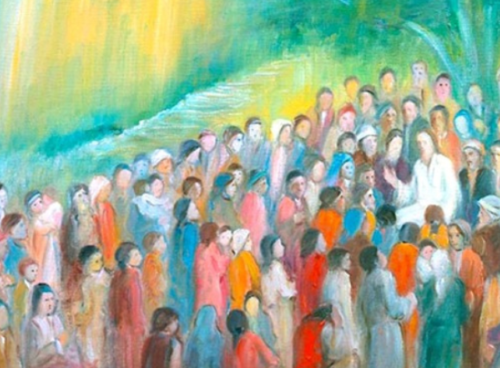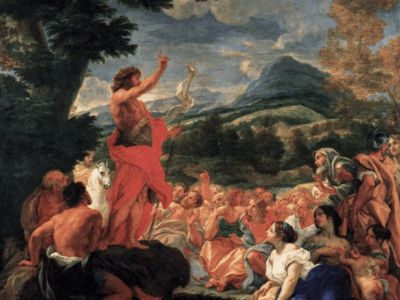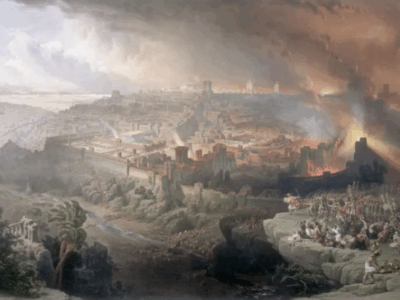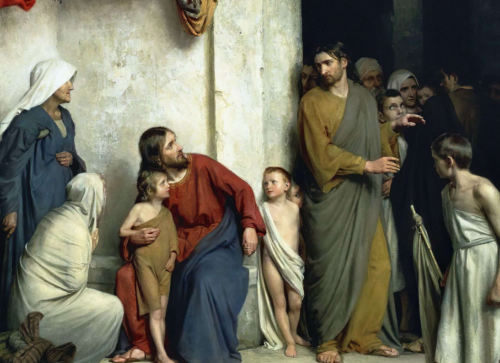
Feast of All Saints’ (transferred)
Year C Readings
Daniel 7:1-3,15-18
Psalm 1 (Psalm 149 is prescribed by the RCL, but its conclusion is so violent I used Psalm 1 instead, which has similar theology but in a different tone and mood.)
Ephesians 1:11-23
Luke 6:20-31
One of the joys of getting back into parish ministry after three years as a hospice chaplain is that I get to rejoin my Revised Common Lectionary study group. This is a clergy support group where we listen to one another, sharing the delights and challenges of leading the Easter People of Jesus in the midst of this broken world. It’s also a study group in which we bounce ideas off each other and examine the passages for the upcoming Sunday. This past Wednesday was my first time back, and my friend, the Rev. Molly Bosscher, hosted us at St. Andrew’s Episcopal Church on the northeast side of Grand Rapids. In addition to a warm and inviting space, Molly also shared a piece of wisdom with us. Speaking about the passage we’ve heard from Luke’s gospel this morning, Molly said, “You know there are some passages of the Bible that I think we can use to sift everything else, and the ‘Beatitudes’ is one of those passages. Right? Like when you don’t know what to do with the Bible or the world or life, you go to the Beatitudes and you kind of let them filter out all the stuff you don’t understand.” As she so often does, Molly hit the nail on the head. Not only is human life in the technological age a perplexing combination of beauty and sadness, of peace and aggression, of hope and despair, the Bible itself bewilders the student of scripture with contradictions and mysteries. Nevertheless, some moments in the scripture are crystal clear, comforting us with the assurance that, as Shakespeare noted so long ago, “the truth will out.” Occasionally there are passages in the Gospels which help us believe that we can in fact respond to our sadness, aggression, and despair. Jesus is slightly more ancient than Shakespeare, and might we say more wise, and what we find out from him today is that not only the truth, but the good will out:
The poor at the margins of so-called civilized life will be placed at the center of life in the Kingdom of Heaven;
Those who live in hunger and loneliness will suffer their emptiness no more;
Those who weep will step into the conscious thrill of the joy of the Lord and will laugh despite the memory of all their sadness;
Those who find themselves ridiculed for enacting the selfless love of Jesus will be vindicated;
Those who forcefully hoard the resources needed for life will be set free from their addiction;
Those who make merry while the world dies will have their hard hearts cracked open;
Those who strive for human flattery will find out about the Living Word.
In other words, everything that gives life to the Creation will be raised up, and everything that deals death will be condemned and pass away. The good will out.
This all sound quite futuristic though doesn’t it? Those who weep will laugh? The hungry will be filled? The startling thing we find in the witness of both the Hebrew and Christian scriptures, however, is that God’s redemption of the Creation from the wages of sin began as soon as human beings were ready to participate. It is no accident that the first divine action of Elohim after the Fall of Adam and Eve is one of redemption: to make them clothes to relieve their anxiety about being naked. And in a very similar way, Jesus blesses his friend Thomas with everything he needs in order to overcome his crippling grief when he says, “Touch my hands; put your finger in my side.” Throughout the whole of scripture, and throughout the entire Tradition of the Saints of the Church, human beings have been invited to commiserate with God about the cruelty and brokenness of the world, and to participate with God in bringing everything back to life.
Now this all sounds hopeful, but if you’re anything like me the message that the good will out still hasn’t landed as something deeply personal. So I want you to think not about Adam and Eve, or the Apostles, or the great Saints of the Church—like Benedict of Nursia, or Francis of Assisi, or Hildegard of Bingen, or Teresa of Calcutta… Rather, think about those people in your life that taught you what it means to look outside yourself and love others.
Picture their face . . .
Search your feelings for the sound of their voice . . .
Ponder the wealth of their love poured into your life . . .
Notice how having known that special person continues to shape you . . .
Dear friends, all these beloved people are the saints too. For each of those people who changed our lives somehow found the courage to participate with God in the redemption of Creation. At some point they found the Spirit of Life calling them to live lives of beauty, peace, and hope. Somehow they found the courage to answer that call, and they poured their beauty, peace, and hope into you . . . into me . . . into us!
They are all still with us, for in the Resurrection of Christ Jesus from the dead, the Creator has reclaimed death from the Evil One and destroyed its futility and finality. Death was always meant to be part of the natural rhythm, but it was never meant to be either cruel or the end of anything. So when in a moment we declare the ancient faith of the Church—that we believe in the communion of saints—reach out with your feelings and touch the ones you love that walk now in a greater light. And while we live on, here, now, in the twilight of the New Creation:
Love your enemies, do good to those who hate you, bless those who curse you, pray for those who abuse you. If anyone strikes you on the cheek, offer the other also; and from anyone who takes away your coat do not withhold even your shirt. Give to everyone who begs from you; and if anyone takes away your goods, do not ask for them again. Do to others as you would have them do to you.
If you will receive the courage to answer this call, if you will come to this Table to be filled and forgiven by Jesus, your tears will turn to laughter and our sacrifice of praise will carry you out into the world to pour your love into others. If you will give in to your yearning for the One who first loved us, surely someone else will reach out to you years from now, and you will feel their touch passing through the boundaries of time and eternity, and you will carry them gently and lovingly to Christ.
Glory be to the Mother-Father,
and to the Incarnate Love,
and to the Spirit of Life:
as it was in the beginning, is now, and will be forever,
a world without an end. Amen.








